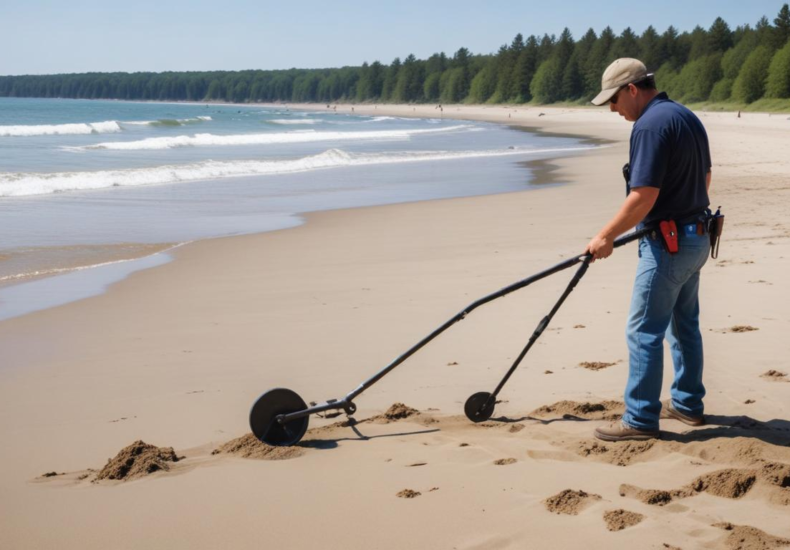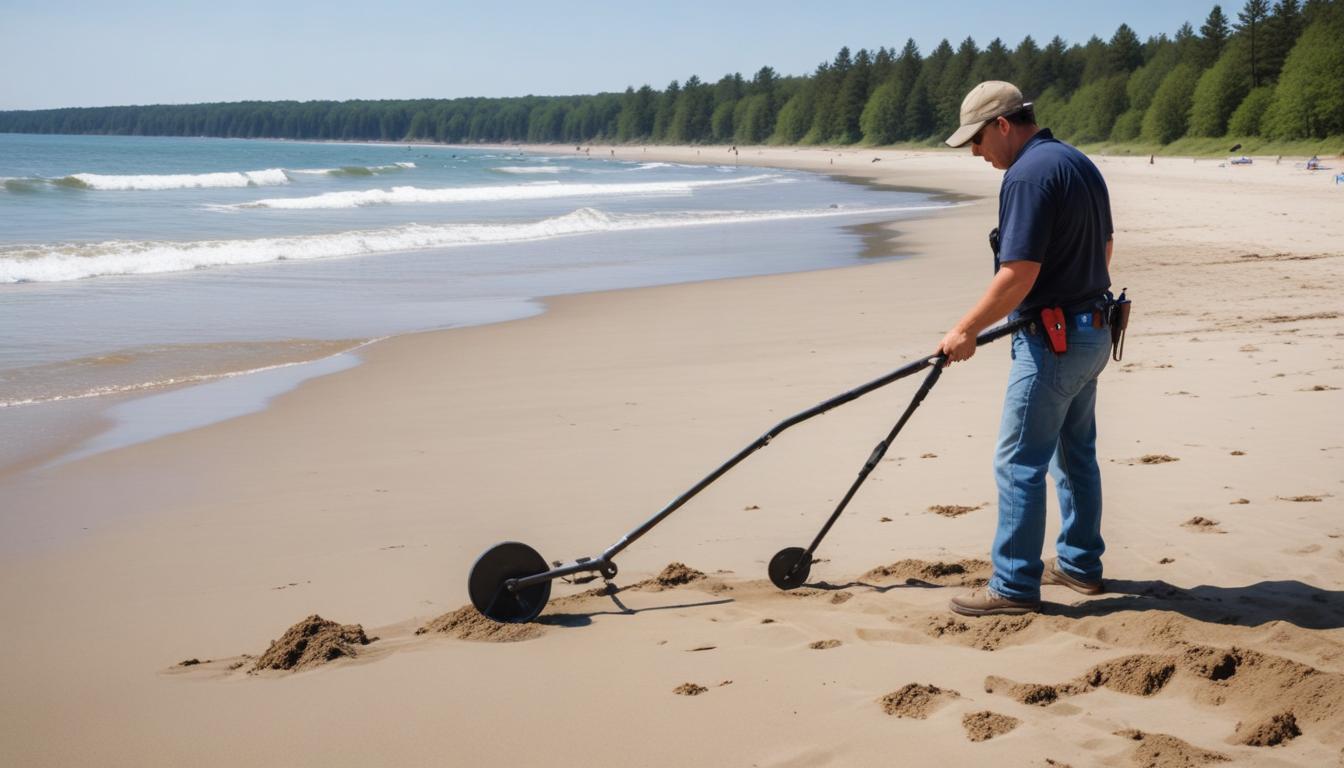
Where to legally use a metal detector in the US
In the United States, the legal framework governing the use of metal detectors hinges largely on federal laws and regulations, particularly when it comes to federal and public lands. According to the Archeological Resources Protection Act (ARPA), it’s illegal to excavate, remove, damage, or otherwise alter or disturb archaeological resources on public lands without a permit. For metal detector enthusiasts, this means that any activity that might reveal or affect historical artifacts is strictly regulated.
Many national forests, managed by the U.S. Forest Service, allow metal detecting but with significant restrictions. Users usually must obtain permission or a special permit before using a metal detector. Furthermore, any items found that could be older than 100 years must be left in place and reported to forest officials. The Bureau of Land Management (BLM) also allows the use of metal detectors on public lands it manages, but typically restricts this to specific areas and under tight guidelines to ensure that no archaeological sites are disturbed.
The National Park Service (NPS), on the other hand, generally prohibits metal detecting in the national parks. This is part of a broader policy aimed at preserving the natural and historical environment intact, which includes artifacts. Ignoring these regulations can result in hefty fines and potentially criminal charges, emphasizing the importance of adhering to lawful practices in metal detecting.
Members of the metal detecting community are encouraged to familiarize themselves with these metal detecting laws, particularly those enacted to protect historical sites. Exploration should be conducted in a respectful and legal manner, preserving the integral aspects of publicly-owned historical sites. Therefore, understanding and complying with the regulations on public lands not only contributes to the preservation of the nation’s rich heritage, but also ensures that the hobby can be enjoyed responsibly and legally.
State-specific guidelines
Transitioning from federal laws to state-specific guidelines, it’s crucial for metal detector enthusiasts to understand that regulations can vary significantly depending on the state. Each state has its own set of rules that dictate the legal use of metal detectors, particularly on state-managed lands. For example, some states might have more liberal policies allowing metal detecting in various state parks and public beaches, while others might restrict this activity to specific zones or require special permits.
For instance, state parks in Texas generally permit metal detecting, but with the requirement that enthusiasts must not dig in areas known to have archaeological significance. In contrast, states like Florida have stricter metal detecting laws on public land due to its rich history of shipwrecks and buried treasures along its coastline. Detectorists in Florida are often required to obtain a permit, and some areas are completely off-limits to ensure the protection of historical relics.
Furthermore, local rules within a state can also differ. Many municipal or county-operated parks have their own regulations, which may not align directly with state policies. This discrepancy necessitates contacting specific park offices or checking their online resources to clarify rules before embarking on any metal detecting expedition. Notably, engaging with local metal detecting clubs or online forums can provide valuable insights into navigating these local regulations, while also connecting you with fellow enthusiasts who share tips and experiences.
Given the diverse regulations across states, adhering to state-specific guidelines not only ensures legal compliance but also promotes responsible metal detecting practices that align with conservation efforts and respect for historical sites. As such, anyone interested in using a metal detector should prioritize acquiring the most current information from the relevant authorities to avoid legal pitfalls and contribute positively to the metal detecting community.
Parks and recreational areas
Exploring parks and recreational areas with a metal detector can be a fulfilling activity, but understanding and following the specific regulations governing these places is crucial. Many parks, especially those managed at the city or county level, allow metal detecting. However, the extent of what is permissible can vary significantly, depending on preservation concerns and local regulations.
Public land managed by local governments may require detectorists to register for a permit or follow strict guidelines about where they can scan and dig. For instance, activities might be restricted to certain areas within a park to minimize disturbances to wildlife habitats or near historical sites. It’s also common for parks to instruct metal detector users to refill any holes they dig and to limit the depth of their digging to reduce the impact on the landscape and infrastructure, such as irrigation systems and buried cables.
Some recreational areas may also have specific rules about the recovery of items. High traffic and heavily used parks may allow the collection of recent items like coins or lost jewelry but strictly prohibit the removal of older, potentially historic items. In such cases, items of historical significance uncovered during metal detecting must be reported to park authorities—a practice that aligns with broader preservation goals and metal detecting laws.
Engaging with park officials before beginning any search activities is always a recommended step. Contacting the park’s administrative office can provide insights into the most current regulations and any potential areas of sensitivity. Moreover, many park websites provide detailed sections on policies regarding the legal use of metal detectors, including maps and specific area guidelines that are crucial for compliance.
Adherence to these rules not only ensures that metal detecting activities are conducted legally but also helps in maintaining the ecological and historical integrity of parks and recreational areas. By staying informed and respecting the established guidelines, enthusiasts can enjoy their hobby without disrupting the well-being and historical heritage of the public land they explore.
Beaches and water bodies

Beaches and water bodies offer unique opportunities for metal detector enthusiasts, but it’s important to understand the specific legal frameworks that govern these areas. For example, finding treasures hidden beneath the sand is a favorite pastime for many, but coastal and shoreline areas often come with their own set of rules that differ from inland locations.
On public beaches, metal detecting is often allowed, but local ordinances can vary greatly. Restrictions regarding where you can detect and during what times of the year can be influenced by concerns about wildlife, such as sea turtle nesting seasons, or public safety, such as crowded summer beaches. Additionally, some areas may allow detecting but prohibit digging, requiring detectorists to use a sand scoop instead. It’s crucial to check the legal use of a metal detector for each beach, which can typically be found on municipal websites or by contacting local authorities.
Bodies of water such as lakes and rivers on public land can also be accessed for metal detecting, but the rules may be even more stringent. Much like beaches, environmental protection laws can restrict the use of metal detectors, especially in areas identified as ecologically sensitive. For inland water bodies located within state parks or recreation areas, the guidelines discussed under state-specific regulations and parks could apply.
In some instances, the Army Corps of Engineers, which manages many inland waterways and reservoirs, will have its own regulations concerning metal detecting. Often, their rules are strict to avoid any disturbance to the infrastructure, such as dams and levees, as well as the surrounding environment.
When planning an outing for metal detecting on beaches or near water bodies, enthusiasts should also be aware of any local metal detecting laws that require specific actions when items are discovered. In many locations, finds that appear to be historically significant, or potentially part of a Native American artifact collection, must be reported to authorities, reflecting a broader commitment to heritage preservation.
Connecting with local metal detecting clubs or online forums specifically focused on beach and underwater detecting can provide additional insights and updates on regulations, and help enthusiasts ensure that their exploration is both enjoyable and compliant with local laws.
While metal detecting on beaches and near water bodies can be incredibly rewarding, these activities come with a responsibility to adhere to established regulations designed to protect public land and historical sites. As such, conduct due diligence by consulting legal and community sources to understand the full scope of where and how you can use your metal detector legally and ethically in these environments.
Obtaining necessary permits and permissions
Obtaining the necessary permits and permissions for metal detecting is a crucial step that should not be overlooked by enthusiasts. Whether you are planning to explore local parks, beaches, or other public lands, being aware of the need for specific permits will ensure that your activities remain within the scope of legal use. The process for obtaining these permissions can vary widely depending on the location and the managing authority.
For metal detector users, the first step is often to determine whether the area of interest is on public or private land. Public land may require a permit from the relevant local, state, or federal agency. For instance, metal detecting on Bureau of Land Management (BLM) property usually necessitates checking in with the nearest BLM office for guidance on whether a permit is required. Similarly, state parks might require a special activity permit that can often be obtained through the park’s administrative body.
The application process for these permits generally involves filling out a form that details your personal information, the specifics of your planned activity, and sometimes the exact equipment you intend to use. Fees for these permits, if applicable, are usually nominal but essential for the maintenance of the managed areas. It’s important to note that permits might restrict the times of the day or year when metal detecting is allowed, which helps reduce conflicts with other park visitors or wildlife activities.
In cases where metal detecting is a more common activity, such as on certain beaches, daily or annual permits might be available. These are particularly useful for regular visitors and can often be purchased online or at entry points to the beach or park. Some locales also require that individuals carry their permits with them during metal detecting activities and present them if requested by an official or park ranger.
The legal ramifications of not obtaining the appropriate permits can range from fines to confiscation of equipment, and even permanent bans from certain areas. Therefore, it’s imperative for those involved in this hobby to prioritize full compliance with local metal detecting laws. This adherence not only fosters responsible metal detecting but also aids in the preservation of archaeological, cultural, and environmental resources on public lands.
Ultimately, the process of seeking and obtaining permits educates detectorists on the specific rules and regulations of their chosen locations. This knowledge ensures that enthusiasts conduct their searches responsibly and ethically, contributing positively to the community and respecting the heritage preserved in these shared spaces.
You may also like
Archives
Calendar
| M | T | W | T | F | S | S |
|---|---|---|---|---|---|---|
| 1 | 2 | 3 | 4 | |||
| 5 | 6 | 7 | 8 | 9 | 10 | 11 |
| 12 | 13 | 14 | 15 | 16 | 17 | 18 |
| 19 | 20 | 21 | 22 | 23 | 24 | 25 |
| 26 | 27 | 28 | 29 | 30 | 31 | |
Leave a Reply